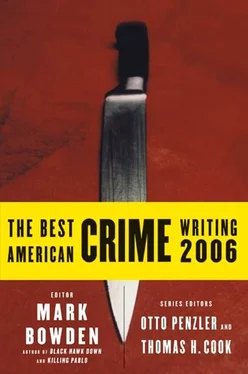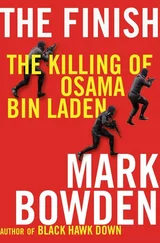At midnight-more than three hours after the fire began raging-SWAT was ordered to search the area.Ten minutes later they found Donald Kueck on his back, nearly cremated, clutching his rifle. When they went to move the body, it crumbled. A few days later, his family scattered his ashes off one of his favorite buttes.
Months after it all went down, the crime-scene tape at Kueck's trailer still fluttered in the wind.There were some old jars of peanut butter and a pair of Nikes (size eleven)-just waiting for the next hermit with a useless dream. The land remained a scavenger's paradise of busted bicycles and generators, engines and furniture, lawn mowers and tables and chairs. There was a broken-down La-Z-Boy facing the buttes-Kueck's chair, according to his family, the one he sat in when he watched the sun rise over the Mojave. From here he could survey his strange desert kingdom. He had come out here to escape civilization, but he knew he could be evicted at any point. The desert was shrinking, and civilization didn't like people who violated its codes.
"Lynne," he said in one of his last letters to his sister,"I'm writing this down because I get choked up when trying to talk about personal issues… I know the next life is waiting for me. I don't want you to blame yourself if the inevitable comes to pass. This feeling has been growing for the last one to two years." Then, in a burst of optimism, he added, "Of course the future can be changed and it would be fun trying. Since I was twenty years old, I've had a dream of building a little place in the desert."
To the right of the La-Z-Boy sits a pallet stacked with eighty-pounds sacks of lime-construction material for the house that Kueck never built. One of these days, he was going to make a course correction. But as always happens with fuckups, he never got there-and never would. Instead, he had picked up a spade and dug his own grave at the edge of his property. It's the first thing you see on the way in and the last on the way out, a project he made sure to finish, now filled in by wind and erosion.
***
Deanne Stillman's latest book is Twentynine Palms: A True Story of Murder, Marines, and Mojave (William Morrow). It was named as a "Best Book 2001" by the Los Angeles Times Book Review, and Hunter Thompson called it "a strange and brilliant story by an important American writer." She is writing Horse Latitudes: Last Stand for the Wild Horse in the American West (Houghton Mifflin). Thanks to Mark Lamonica for help on this piece.
Coda
This story was originally much longer, taking me down another strange trail on my desert beat and into one big empty scream. But this time I had a map, an escort, and a pit bull. "Go down V Avenue," said the map. "Just before the pavement ends there is a small fenced in area with some gas lines in it. Take a right-hand turn.Then go 0.9 miles and take a left where a house used to be. Go 2.3 miles, take a right hand turn, then go 0.45 miles and turn left-you might notice some Christmas tinsel in the sage brush. In another 3.5 miles take a right at the intersection. At this point if you look into the mountains, you should be lined up with a road going towards them…"
It was as if I had dropped through some freeway sinkhole in Los Angeles and ended up in its sad and lonely heart-an hour from the Warner lot, just beyond the San Gabriel Mountains, where Donald Kueck had watched the stars, studied search-and-seizure law, and talked to animals. This was a berg called Llano, once home to a utopian community where Aldous Huxley lived. Like most utopian communities, Llano vanished.Today, packs of stray dogs are drawn to its crumbling stone ruins and hard-core desert eccentrics eke out a living in its shadows. Llano was part of Steve Sorensen's turf and he knew it well. In fact, in the year prior to his murder, he had driven past Donald Kueck's property at least twenty times, on his way to the squatter's to try to evict him. Considering their violent confrontation nine years earlier, I have often wondered what each man was thinking as they came into each other's orbit. Perhaps Sorensen thought he should finish the job. Or perhaps he was on a personal tactical alert, knowing he was within range of someone who had tried to get him fired. And what about Kueck, increasingly paranoid in his last months? He would have heard the big SUV rumbling across the desert dirt, might have even had the deputy in his rifle sight. Or perhaps it was nothing like that at all; perhaps Kueck was too baked to hear anything but the voices in his head and maybe, when Sorensen turned down Kueck's driveway on that August day, he had no idea that he was about to confront a guy he had subdued at gunpoint a long time ago.When he saw the Dart and ran the plates and the dispatcher identified the owner of the car, did he then recognize the name? If he did, he wasn't saying, and anyway, the dispatcher garbled "Kueck" (it's pronounced "cook"). But the stage was set: two men who loved the desert, one with a future, and one with memories only, were about to finish their dance. Maybe that's when it all came back-just before Kueck opened up with the assault rifle-"Oh Christ," Sorensen might have thought as his knees buckled,"it's that lawsuit nut!" Or maybe he said it out loud; his mic was keyed and the dispatcher heard the gunshots-although my sources tell me no words were broadcast.
Three years after it happened, there are some images I can't forget. One is a photo sent to me by Don's sister Lynne. It's a breakfast table for jackrabbits, outside Don's trailer. Long ago and a few miles away, jackrabbits were nearly clubbed to extinction, lest they raid settlers' crops. In this picture, each is eating out of its own dish. I've seen other photos of Don with animals, and although he's not in this one, I'm sure he's smiling. The other image is something a childhood friend of Sorensen's described to me. "I remember how happy he was the day he went off to the army," she said."He sat on the lawn and polished his boots."
Some say that LASD should have waited Kueck out instead of going in for the kill. As it turned out, the tear gas was blown away by the high winds and what started the fire was road flares, dropped into the hideout as a last-ditch effort to flush Kueck. But it was his script, his ending, and he went up in flames. In an investigation, the D.A. called the tactic unusual, but LASD was cleared. If you kill a sheriff and throw his brains in a bucket, you can't expect much more than that-and I'm sure Kueck didn't. Ironically, the squatter who triggered this sad chain of events survived. Last I heard, he was living on a dry lake bed near Barstow.
Grateful acknowledgment is made to the following for permission to reprint previously published material:
"Blood Feud," by Mary Battiata (Washington Post Magazine,May 22, 2005). Copyright © 2005 by Mary Battiata. Reprinted by permission of the author.
"Hit Men in Blue?" by Howard Blum and John Connolly (Vanity Fair,August 2005). Copyright © 2005 by Vanity Fair. Reprinted by permission of the authors.
"The End of the Mob," by Jimmy Breslin, originally appeared in Playboy magazine, August 2005. Copyright © 2005 by Jimmy Breslin. Reprinted by permission of the David Black Literary Agency.
"Operation Stealing Saddam's Money," by Devin Friedman (GQ, March 2005). Copyright © 2005 by Devin Friedman. Reprinted by permission of the author.
"Sex Thief," by Denise Grollmus (Cleveland Scene, September 14, 2005). Copyright © 2005 by the Cleveland Scene. Reprinted by permission of the Cleveland Scene.
"Dr. Evil," by S. C. Gwynne (Texas Monthly, September 2005). Copyright © 2005 by Texas Monthly. Reprinted by permission of Texas Monthly.
"The Choirboy," by John Heilemann. First published in (New York magazine May 30, 2005). © 2005 by John Heilemann. Reprinted by permission of the Wylie Agency.
Читать дальше












